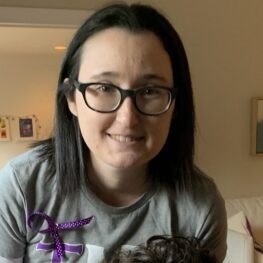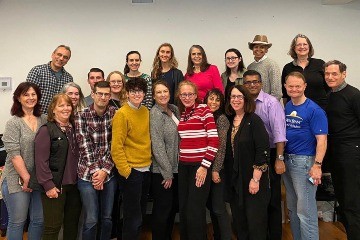When we first spoke to Courtney in the first week of the United States’ nationwide lockdown, she was fearful about how a global pandemic would affect her access to specific foods she needs in order to stay healthy. Now, those fears have extended to her access to medical supplies, emergency doctor’s appointments, and protecting her family.

Courtney in Mast Cell Disease swag on World Rare Disease Day
Courtney is a New Yorker with Mast Cell Activation Syndrome, and when she’s not volunteering with the Mastocytosis or Ehlers Danlos Society, she’s working full time from home and is a mother to her six year old son, who has hemophilia. Courtney says “the effects of living with mast cell disease is like socially isolating all the time. I’m constantly sanitizing, and I can only eat certain foods, which we’re constantly stockpiling.” As she and her family continue to quarantine themselves in response to the COVID-19 pandemic, Courtney has some advice for others that are struggling to understand what life is like for people right now living with a rare disease.
Now that the rest of the world is also living in a hyper-aware state, Courtney reflects on how she is better equipped to handle this than most. “I’m used to losing things because of my illness. But obviously now the whole world has had to experience this on a much grander level, and it’s very scary.” Courtney says “I love going to Target, but I’ve been medicating and wearing a mask and gloves there for years. Because of COVID-19, the whole world is now living in our normal.”
New Normal
Courtney says she feels a responsibility to share her experience, in the hopes that it will comfort first time quarantiners and those who are scared for their health. She even started a blog called A Rare Normal to record her thoughts and keep us updated with how she and her family are dealing with the effects of her illness during the pandemic.
“All of these precautions people are taking are things I have already been doing for years to prevent an anaphylactic reaction.”
Courtney explains her Mast Cell Disease using the “bucket theory.” She says, “I start off every day with an empty bucket and every exposure, food, pollen, stress, cleaning supplies, fills my bucket. I take medication to make sure the bucket doesn’t overflow, but when it does I have a reaction – sometimes even anaphylaxis.” Like so many others, Courtney is learning to adapt to life at home while homeschooling her son. She says, “It’s not too bad because we are able to spend time with each other. And while my son also has a rare disease, we have thankfully been able to continue his care at home as well.”
“The only thing I can say i’m grateful for is that i’m not sick. I’ve done this exact thing for weeks on end feeling absolutely awful, so at least now I can spend time with my family and we can entertain each other at home”

Courtney currently serves on the Ehlers Danlos Society Comorbidity Coalition
Since Courtney and her family are continuing to self-quarantine, Courtney says she’s not so much worried about keeping people safe within her house, but rather the danger of going outside to get the necessary treatment or groceries. Courtney is terrified to go in and see the practitioners she needs to stay healthy. “Heat, pollen, perfume, certain cleaning supplies, shellfish, and any airborne foods” are just a few items in a long list of things that cause her Mast Cell Activation Syndrome to become hyperactive. Regular treatments and hospital visits, while already putting her at risk, have now become even more dangerous.
While she is constantly working to keep her “bucket” as empty as possible, Courtney is “becoming an expert with any company that delivers things.” In trying to keep herself and her son stable, Courtney continues to manage her and her family’s product sensitivity and medication upkeep.
Still Hopeful
While Courtney continues to be overly cautious, she recognizes the importance of grieving those milestones and experiences we are all missing out on. “Your mental health is important too. And it is totally valid to mourn the loss of things that would have otherwise brought you joy.. That is the only way we’ll be able to cope and be empathetic towards these vulnerable groups. Because that’s our real life experience that everyone now gets to have a taste of.”
She urges others to consider the implications of their actions. “In the grand scheme of things, these few months of your life are very manageable. We are all struggling, we are all lonely, but at the end of the day, everyone needs to be empathetic for those who are most vulnerable. Because many will not survive this.”

Stay Connected
Sign up for updates straight to your inbox.
